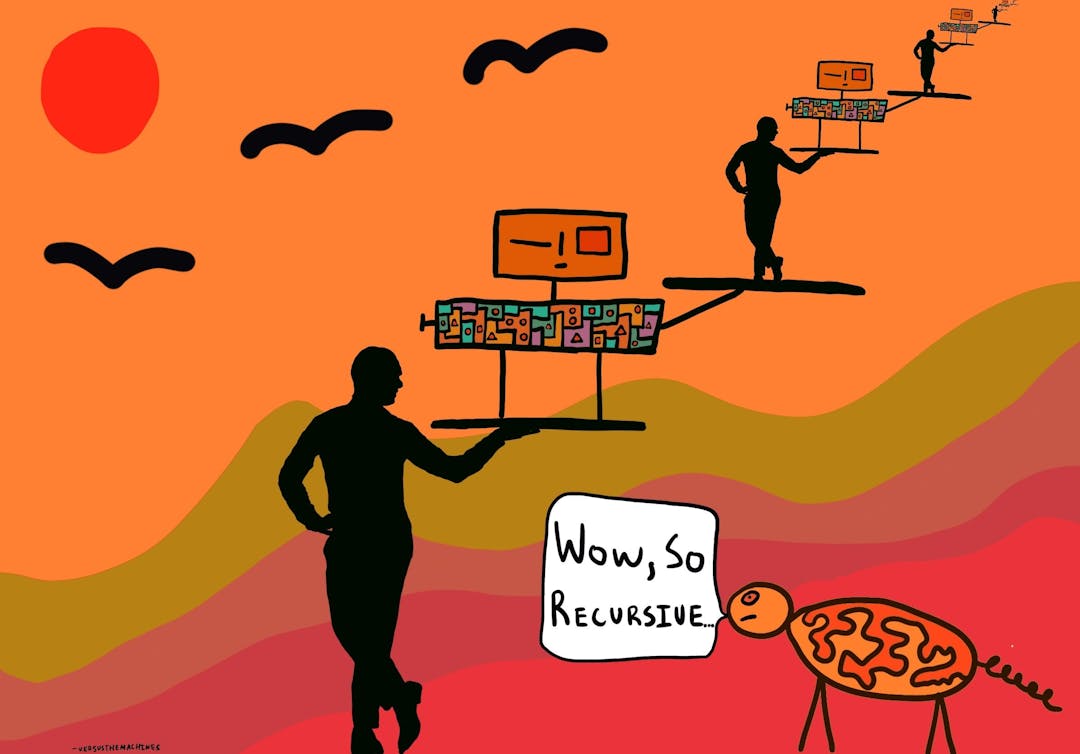Bullsh*t jobs: Understanding Work and Value in the Information Age
“Where you work is going to inform your values, and that can be a good thing. But it can be a negative thing as well, when you’ve got too much bullshit in the ecosystem that actually isn’t worried about the outcome. It’s only worried about the appearance of those who are actors in the process.”
Intro
The difference between lying and bullshit is that liars want their audience to believe their message and bullshitters don’t care. Bullshit is about saying whatever it takes to convince another party of something about the speaker – usually that they are competent and useful. This concept has trickled into the workplace in an insidious way. Bullshit jobs make an organization look more robust, productive, and legitimate but actually provide very little return on investment or impact.
While bullshit jobs keep people employed, they can also have negative consequences for our economy and society. Holders of bullshit jobs make up the “bullshit army” backing a CEO or executive’s decision-making process. In this way, leaders may be able to get away with controversial decisions or ideas, through wave after wave of employees who nod their heads in agreement, confident in the knowledge that it’s easier to get ahead by sending signals up the chain that people want to hear—whether or not it’s what they need to hear.
When work is meaningful – and not “bullshit” – it can shape and appeal to our value systems, allowing us to feel fulfilled by a belief that we contribute to something bigger than ourselves. Even through non-meaningful work, people are often able to discover and embody their own value systems. In this way, work – which can take up half or more of our waking hours – becomes an important part of who we are, how we view the world, and what makes up our society’s values. When our jobs feel like bullshit, our social order suffers.
So, how can we bridge the gap between “bullshit jobs” and our aspiration for meaningful, value-informed work? One suggestion from our panelists – senior consultant Jayden Rae, research director Dr. Brooke Struck, and associate Nathan Collett – is defining our own success. Frequently, in North American workplaces, success comes down to meeting financial targets or completing a series of tasks delegated by executives. It is often misaligned with employees’ values and misses the mark on intrinsic motivation. Even when work does contribute to meaningful good, impact is often not communicated back to employees themselves, robbing them of the opportunity to feel fulfilled by their labor. For this reason, making impact more salient to employees and determining our own barometers for our success are crucial to living a meaningful, value-fulfilled life through work.
This conversation has been edited for clarity and concision.
Behavioral Science, Democratized
We make 35,000 decisions each day, often in environments that aren’t conducive to making sound choices.
At TDL, we work with organizations in the public and private sectors—from new startups, to governments, to established players like the Gates Foundation—to debias decision-making and create better outcomes for everyone.
Discussion
Nathan: In this latest instalment of TDL’s Perspectives project, I’m sitting down with Brooke Struck, our research director, and Jayden Rae, senior consultant here at The Decision Lab. Today, we’re going to be talking about bullshit jobs: what they are, where they come from, what defines meaningful work, and what role work plays in a meaningful life. So to get started, let’s think about this concept a little bit, and break it down. Brooke, can you tell me a little bit about what a bullshit job is and where the idea came from?
What Are “Bullshit Jobs?”
Brooke: Sure, let’s start with one component of this idea at a time. Harry Frankfurt is this American philosopher who wrote an excellent essay called “On Bullshit,” where he distinguishes bullshitting from telling the truth and lying. So, telling the truth and lying have one thing in common: they both have a respect for the truth. And when you’re telling the truth, you’re trying to convince someone that something is the case. When you’re telling a lie, you’re trying to convince someone that something is the case, it just so happens that that something isn’t true. That thing is false. But when you’re bullshitting, you’re not actually trying to convince anyone about anything out there in the world. You’re trying to convince someone about you. It’s more about the speaker than about the world that they’re speaking about. Bullshit, in that respect, is extremely performative.
So the way that that plays out in a professional context around business bullshit, for instance, is around jargon and acronym soup and all of these kinds of things that appear to be very meaningful and well-thought-out and cutting-edge and innovative, but in fact, they’re often extremely vacuous of any content. That’s what gives them their performative aspect. It’s a way that the elites in the business world do their little secret handshake to show each other that, “I’m an elite and you’re an elite and we agree that this system is effective in perpetuating our ability to exert power.”
Bullshit jobs are the downstream effect of that – in creating this whole economy of jargon and bullshit within an organization, it needs to have physical manifestations, as well. The bullshit meeting leads to the bullshit minutes, which leads to the bullshit action items, which leads to the bullshit jobs to go and chase all of those things down. That’s what a bullshit job really is: it’s someone whose role, majorly or entirely, is to do service to that bullshit economy, essentially just holding up the cape of the executive person who marches ahead of this army of bullshit jobbers behind them.
"That’s what a bullshit job really is: it’s someone whose role, majoritarily or entirely, is to do service to that bullshit economy, essentially just holding up the cape of the executive person who marches ahead of this army of bullshit jobbers behind them."
Nathan: That’s great. So before we dig into each one of those concepts, Jayden, what do you think about the way this concept came about? Do you think there’s more bullshit out there today than there has been in the past?
Jayden: Yes, and that’s a really interesting question. I’ll draw from David Graeber, a social anthropologist who wrote the book which put this topic on center stage, not surprisingly called Bullshit Jobs. He examines how the division of labor has changed over time, and that this idea of bullshit jobs is actually a fairly recent phenomenon. He looks at the U.S. labor market over time. In the early 1900s, you saw that only one-fourth of jobs could be qualified as a professional job, something like corporate law or a consultant or a lobbyist, something or another job that would fall into that category. But going into the early 2000s, over three-fourths of the jobs in the U.S. labor market would be considered professional jobs.
Graeber suggests that because of this general shift in developed countries towards outsourcing and the professionalization and industrialization of labor, bullshit jobs have necessarily been created to keep people employed. And a lot of these jobs are not actually productive jobs in the sense that previously blue collar or agricultural jobs used to be productive. And given a lot of the political and social incentives to keep people employed, and also these really deep-rooted Protestant work ethics that value over-work, he essentially argues that a lot of these jobs have been created despite the fact that they don’t produce the same types of material returns other, previously seen labor would.
"Given a lot of the political and social incentives to keep people employed, and also these really deep-rooted Protestant work ethics that value over-work, [Graeber] essentially argues that a lot of these jobs have been created despite the fact that they don’t produce the same returns other, earlier forms of labor would."
Brooke: Yeah, that’s a really interesting point, that if we think about what the economy produces, when you’ve got 75% of your economy working in agricultural production or manufacturing production or these kinds of things, the outputs of those sections of the economy are quite tangible, and you can assess the quality of those outputs in some fairly concrete, standardized, and genuine ways. When it comes to certain modern professions, such as certain business or advisory groups, but also to some degree bureaucracies and governments, to a large extent, what they create is decisions and consensus. And assessing the quality of a decision, or even a decision-making process, is very hard to do. And often, how much organizational momentum has built up behind the decision subs in as a proxy for how good a decision is. This creates an incentive system for people to build up armies of people behind them, who trade in this economy of building up the appearance of organizational momentum behind a decision.
"Often, how much organizational momentum has built up behind the decision often subs in as a proxy for how good a decision is. This creates an incentive system for people to build up armies of people behind them, who trade in this economy of building up the appearance of organizational momentum behind a decision."
Organizational momentum or “the bullshit army”
Nathan: Let’s talk more about the idea of organizational momentum and elites needing this support system behind them. Recently, there was some commentary on the way the Senate operates, especially when confirming judicial appointees. Masha Gessen writes in The New Yorker that in the confirmation of Amy Coney Barrett, senators made 25-minute speeches that had nothing to do with the topic – they made a farce of the entire process. This, Gessen suggests, is the epitome of a bullshit job. They’re facilitating a process and providing legitimacy to something that would otherwise necessitate critical thinking.
So, do you think this idea is related to a shift in the way people are conducting critical thinking? I mean, you’re suggesting that experts and elites have these support systems, or “bullshit armies.” Does not having to justify their ideas alone help them avoid potential controversy? Are they able to use this army of people working for them to make their arguments and ideas seem legitimate, even when they’re not?
Brooke: Yeah, I think that there’s definitely a strong argument to be made there, that one of the things that people really look to avoid is isolating themselves, especially around a decision. No one wants to feel like they’re standing on an island, left holding the fort on a single decision, because that creates great professional risk for them. It’s much easier to defuse that risk if you say, “Well, I may have made a bad decision, but there was a group of eight decision-makers around that table, and we all came to that decision together, supported by our armies of analysts, who each combed through the background material. So if a mistake was made – which of course I will never divulge or I will never acknowledge – then certainly, it can’t have been my fault. It must have been a totally reasonable error, such that all of us working on this thing together all came to the same conclusion.”
Nathan: To couch this process in terms that may be familiar to people in the decision-making or behavioral science field; we can make a distinction between process and outcome here, right? The outcome of the decision is one that is consequential and serious. It’s the process that’s being trivialized by these jobs that justify the outcomes without contributing to the facts of the case that might sway people by more legitimate means. Because these jobs don’t do anything, they should not actually affect the outcome, other than to support one that otherwise would not make it through an honest decision-vetting process.
I want to pivot a bit to technology now and to explore how that feeds into this process. Let’s think about the evolution of bullshit jobs as a big part of the economy. There are certain technological developments that are responsible for or have contributed to the ease with which bullshit jobs take place. We talked about a shift from certain forms of employment that basically rely on either physical or manual labor. Now, we’re getting into the labor of decision-making, which is often facilitated by all sorts of different technology, whether it’s thousands of emails, Slack channels, or other softwares. It’s a little bit lighter and harder to pin down where the actual work is getting done and what work leads to measurable outcomes.
Let’s think about what Jayden said earlier about the fact that the pursuit of full employment coupled with a Protestant work ethic makes for a dangerous combination, where self-image is tied in with the value of working hard. Is it bad that we see this shift to technological and more professional forms of work, and that we’re losing a sort of integrity to the way we work? Or is it a more complicated story than that?
Jayden: To turn your question on its head, again, going back to David Graeber, he has a really interesting thesis. He essentially says, “The main problem with bullshit jobs is that people derive their sense of self and self-worth from their work.” I guess it’s a complicated situation because people often enter jobs with underlying values and expectations that they will gain some self-development or some self-actualization through their work. Often, however, they enter a very bureaucratic system where they might not actually acknowledge through their work that they are fulfilling a pointless job. In these cases, we can see actual societal harm, when a lot of individuals fall into this category. So it’s actually problematic in the sense that the separation between process and outcome is actually harmful to individuals, as well.
"People often enter jobs with underlying values and expectations that they will gain some self-development or some self-actualization through their work. Often, however, they enter a very bureaucratic system where they might not actually acknowledge through their work that they are acting out a pointless job."
Meaningful work
Nathan: That’s fascinating. In that case, what makes a good job?
Jayden: I think one thing that has made me think about work a lot is the movement of effective altruism: thinking about how you can use your career in a way that aligns with other values or other aspirations. The effective altruism movement is in line with the philosophy of utilitarianism, which is basically the idea of people trying to create the most good. And so, they think about this in terms of trying to create a career that’s aligned with yourself, your own skill set, and to have the largest impact you can. I think for many people, if there’s an opportunity to create a career path that allows them to have an impact on the things they care about in the greatest way possible, but not only that, that those positive impacts or outcomes are really salient to them, that’s really important. This is something Nava Ashraf speaks and writes a lot about, centred around what she calls altruistic capital, which is essentially how much meaning and personal fulfillment a certain job or company can provide.
[Read here: Nava Ashraf on altruistic capital.]
"I think for many people, if there’s an opportunity to create a career path that allows them to have an impact on the things they care about in the greatest way possible, [and also] that those impacts and those positive impacts or outcomes are really salient to them, that’s super powerful."
Nathan: And that’s basically the exact opposite of a bullshit job, right? All of a sudden, the work is not only productive, but it’s also meaningful to you because of the values that underlie it. We can expand and think about some other things that come into the picture when we think about valuable work and what it is to have a good job. At the risk of exposing my inadequate knowledge of his theory of labour, I can say that Marx talks about alienation and ownership being valuable in one’s work. Someone needs to have a connection to the product they’re spending eight hours a day laboring over, and that’s a source of value to them when carried out autonomously. Being connected to what comes out at the end of your day is important. Do we think that that is another source of value, or can we only really find value in social value, in our own values, as opposed to the monetary value of what we produce?
Brooke: Yeah, that’s one of the challenges with theories like utilitarianism, and even the economic theory we’ve held prominently in North America and Europe since the 1980s – this idea of fungibility, that a dollar is a dollar is a dollar. In the case of utilitarianism and the effective altruism movement, a quality is a quality is a quality. I don’t necessarily buy that in terms of work feeling meaningful. So certainly, Jayden, one of the things that you mentioned in what you were discussing before is about salience: feeling the tangible connection between the work you’re doing and the outcomes that you’re helping to promote.
This other angle around fungibility is to acknowledge that there are different kinds of value. It’s qualitatively different to promote environmental outcomes from promoting social equality or economic prosperity. It’s a different type of goal to promote community cohesion within a city versus within a province. We can’t make trade-offs between these goals, or at least those trade-offs are not as straightforward as just optimizing two things measured in the same units. So, I think, we need to unpack these kinds of questions to get at this notion of what constitutes a good job for an individual.
But at the structural level, what makes a good job, if we want to build on these two ideas, are first of all that you’re advancing a type of good that is important to you as an individual. And second of all, that the efforts that you put in to advance that good are done in a way that promotes a certain amount of salience as to how you are contributing to that process.
Bridging the gap
Nathan: Let’s take what we’ve been talking about, the last things Brooke was saying about having your values apply to your work versus recognizing your place in a process irrespective of its eventual output, and how someone who recognizes that they are in a non-ideal job might work to improve it. Or how could a non-ideal working environment be improved and made more meaningful to employees?
Jayden: Yeah, it’s a challenging question. I guess you can look at it from two perspectives. One is more at the organizational or institutional level of those people who are actually creating the structures of the organization, and the types of roles and activities that people who are employed should fill, and to be really critical about the purpose of all those positions. A lot of these more bullshit jobs exist because they’re creating non-lasting solutions to problems, or potentially, they’ve fallen into middle management where they’re creating extra work to look productive themselves, extra work that’s not necessarily productive. So I think really effective organizations are firstly really self-reflective and critical about the structure that they’ve adopted.
"A lot of these more bullshit jobs exist because they’re creating non-lasting solutions to problems or they’re middle management. They’re creating extra work to look productive themselves, extra work that’s not necessarily productive. So I think really effective organizations are firstly really self-reflective and critical about the structure that they’ve adopted."
I guess for individuals, it’s quite a subjective experience. It’s possible someone is fulfilling what we may qualify as a pointless job, and they may have convinced themselves or genuinely believe that their job is not, in fact, pointless. So I think it’s important to preserve individuals’ agency and autonomy when we’re trying to classify different types of jobs, and not categorize a whole group of them as being pointless. That aside, I guess to the extent that you can, you should try to create relationships that give you leverage in trying to change what your job looks like.
Brooke: Okay, so you talked about how it is that we can resuscitate jobs that might feel particularly bullshitty. One thing I think is really important here is assessment and evaluation. One of the challenges, as I mentioned, that drives the bullshit economy is how hard it is to assess a good decision-making process. So if indeed that is one of the key drivers of the bullshit economy, the solution then is to design effective alternative assessment processes to determine how well a decision-making iteration has gone. If you find something that you can put into the place of organizational momentum to assess the quality of a decision, then you remove the incentive to have a whole army of people lined up behind you to say, “This is the right thing to do.” Your incentive system shifts to whatever that new assessment mechanism is.
Nathan: What can that look like? I mean, do we have any strategies for assessing the quality of a decision? There’s a lot of talk about post-hoc versus in-the-moment assessments, of whether a decision is right before it gets made versus whether the result was the right one. But beyond that, what would assessing the quality of a decision look like?
Brooke: Now, the short answer is that getting rid of biases is what you need in order to have a good, clean decision-making process. That doesn’t mean that every decision you make is going to turn out well, but it does promote better decisions coming out the end of the pipeline. And in sufficiently large numbers, better decisions lead to better outcomes. But there’s this challenge around individuals being identified with individual decisions, which are identified with individual outcomes. To circle back to a point from earlier in our discussion, people do not want to be held accountable for big decisions until they pay off. So one of the uniquely punishing aspects of a bullshit job is that you’re there to diffuse accountability for a major decision-maker if things go badly. But that decision-maker will also be happy to take the credit themselves when things go well. And that creates a major problem that drives the existence of the bullshit economy.
"But there’s this challenge around individual people being identified with individual decisions, which are identified with individual outcomes. And that creates a major problem that drives the existence of the bullshit economy."
I think that in terms of finding one’s own work fulfilling, there’s something to be said about how we evaluate our own contributions. Speaking from personal experience, I think one of the most important things in my career has been retaining ownership of the markers of what constitutes success. In my own career, all of the times I’ve done what I consider to be my best work and had the most impact has been in those moments where I was the arbiter of my own success. Whether things were going well or badly, it was something for me to figure out, rather than waiting for those around me to determine it on my behalf.
Nathan: That strikes me as something characteristic of more senior positions or smaller organizations, Junior people in bigger organizations would likely have to find their goals and approval from above.
Brooke: For sure it’s easier the more senior you are, though I started taking on this kind of ownership as early as university and graduate school. In professional contexts, I think the gap that I’d want to open up there is that what your manager tells you about your performance is not necessarily an accurate reflection of your value. We need to be able to internalize the idea that our value is something we need to determine. You can be inspired by others and you can pick up pieces from these external systems to validate your work, but ultimately, you are the one who needs to give validation about the work you do. It’s you who needs to be able to sleep at night doing the job that you’ve done. It’s you who needs to be able to motivate yourself to spring out of bed in the morning excited about your work. That’s a really valuable way to get away from this bullshit job, to go through the very, very difficult and wrenching process of self-examination to ask myself, “What do I think good work looks like? What constitutes a good job for me?”
"What your manager tells you about your performance is not necessarily an accurate reflection of your value. We need to be able to internalize the idea that your value is something that you need to determine…you are the one who needs to give validation about the work that you do."
Those are very, very difficult questions to address. But ultimately, and again, speaking from personal experience, I’ve found that things have worked out most for me when I’ve stopped worrying too much what others thought. Acknowledging the enormous benefit and privilege that have allowed me to do so, I’ve essentially had the opportunity to define my own success criteria. There was obviously minimal stuff that I needed to feed to my committee during my PhD to keep them off my back, but more or less, as long as minimal boxes were being checked elsewhere, I could define my own success. If those boxes are not minimal, you don’t have as much freedom. (I say that in the sense of psychological freedom, freedom as an individual, to undertake those kinds of self-explorations and self-criticisms.) Because in fact, you can create danger for yourself by creating too much of a disconnect between what you define to be a good job for you and what the external ecosystem is demanding of you.
Defining our own success
Nathan: It’s interesting you say that. A lot of people struggle in grad school, precisely because of the struggle to define their own ideals, to work off their own timetable, but more importantly, what you’ve just been saying, to define what success looks like according to their own benchmarks, and to follow that. I wonder if we can find a distinction here, a really important one, between the hardship that comes with that sort of freedom, and the hardship that comes with adhering to someone else’s goals or timelines. In both cases, you’re facing a struggle and a challenge to articulate something about yourself.
And perhaps it’s just the struggle of self-fulfillment here that is a struggle worth undertaking. But it’s daunting to propose creating your own success criteria as a solution for most people, most of the time, because we don’t necessarily consider it a possibility. It’s a lot easier for you to follow someone else’s orders, often. That’s the norm in most cases, for most labor jobs. But is that a realistic framework? Is self-fulfillment through one’s own definition of value something achievable for most people in most jobs?
Brooke: A cynical side of me says, “No, not at all.” I’m not sure what the answer is to that question about how feasible that is at scale, or at what scale that is feasible. I know that the way we tell the success stories of others does not set us up well to tell positive stories and feel positively about our own experiences of success. In terms of these reflections of what constitutes the good life and all these kinds of things, there is a deep and rich history of that kind of inquiry in philosophy, in literature, in history, in art. I would say the vast majority of that tradition of discourse exists within the humanities, which is absolutely not the thing that we train people in.
The liberal arts refer literally to the art of liberation, specifically self-liberation, leading the life of a free citizen. That is what we denigrate when we denigrate liberal arts: the freedom of the individual. And so, we end up in this situation where not only does the economy not provide us many opportunities to define our own success, but we also are not very effectively tooled up to be able to entertain those conversations, even if we have the luxury of doing so.
"Not only does the economy not provide us with very many opportunities to have the luxury of defining our own success, but we also are not very effectively tooled up from the start to be able to entertain those conversations, even if we have the luxury of doing so."
Nathan: Okay, so let’s complement that. To provide a middle ground that’s a little bit more positive on how we might achieve this for more people, more of the time, I’m going to point our attention to another New Yorker article. This article points to the fact that no one’s talking about one element of Biden’s economic plan, which is called the Civilian Climate Corps. Basically, it’s plagiarism of FDR’s creation of the Civilian Conservation Corps, which was a government relief program for unemployed people, allowing them the chance to do “voluntary” public work for a stipend. This program was a resounding success that ultimately employed over three million young men. Nowadays, for the Civilian Climate Corps, the jobs work toward climate change relief efforts.
These jobs are manual labor, but they serve a greater purpose. Obviously, they’re in pursuit of increasing employment in a time of significant struggles to find work and rebuild a sort of national pride in the kind of labor they’re doing. They’re centering it around ideals that perhaps people can discover for themselves through the work. This is not necessarily because the workers decide what to do every day when they wake up, but, within a defined project, perhaps people can find fulfillment according to values that are somewhat removed from what they’re doing day-to-day.
So someone who’s working, whether it involves building a wind turbine or tallying numbers on spreadsheets, they are working toward a purpose that is solving the global issue of climate change. That’s a different job than someone who is doing the same thing towards facilitating fracking, for example, which is obviously harmful to the climate. So, these people may be doing similar jobs day-to-day – tallying numbers, looking at spreadsheets, working in factories – but their efforts are toward directly opposite goals.
There is a difference there, I think, in the kind of values that are being pursued that you can sign up for. You can have your tasks delegated to you in this role, but you may understand something about yourself and what you believe in through the way these jobs shape your character or introduce you to a new environment and a new set of values. You may have even implicitly held these values before, but you might bootstrap that process of self-discovery through a more organized system. I think to some extent that connects to the idea of finding your values in your work, even if you don’t have to create each of those values yourself. You could find them through labor.
Brooke: Yeah, absolutely. I think about Marx and the alienation of the means of production from the value which is produced. There is a way for that to run in the opposite direction, as well. Marx’s point, I think, only has bite because when it’s done properly, reconnecting with the products of our labour can be a source of value. And so, we shouldn’t think of our values as one thing over here on this side of the firewall and our work as this kind of thing over here on the other side of the firewall, and that values need to come first and that’s going to inform the type of work that we do. Absolutely not. There is not a clean firewall between those things. Where you work is going to inform your values, and that can be a good thing. But it can be a negative thing as well, when you’ve got too much bullshit in the ecosystem that actually isn’t worried about the outcome. It’s only worried about the appearance of those who are actors in the process.
"I think worrying about the outcome is essential to the general process of discovering your own values. If you already have a good idea of your values, work helps you execute them in the real world. If you’re still discovering them, which most of us are, then meaningful labor has to be a process for doing that, alongside other institutions."
Nathan: I think worrying about the outcome is essential to the general process of discovering your own values. If you already have a good idea of your values, work helps you execute them in the real world. If you’re still discovering them, which most of us are, then meaningful labor has to be a process for doing that, alongside other institutions. Anthony Appiah has this idea that governments and families are traditional loci of people’s values, and also places of expression. When we debate the legitimacy of broadening the notion of family to more than two parents or non-heterosexual couples, for example, we’re redefining our values through the institutions of family. I think labor is also one of these institutions that we can use to execute and redefine our values.
Brooke: Yeah, I absolutely agree. In a way, we should ask ourselves how we ever believed otherwise. How could we have ever thought that we spend half of our waking hours—sometimes more—doing something and that that thing wouldn’t have a massive impact on our values and perceptions of the world?
Nathan: Alright – let’s leave it at that. Thank you both very much for sitting down with me and having this discussion. More to come soon.
About the Authors
Dr. Brooke Struck
Dr. Brooke Struck is the Research Director at The Decision Lab. He is an internationally recognized voice in applied behavioural science, representing TDL’s work in outlets such as Forbes, Vox, Huffington Post and Bloomberg, as well as Canadian venues such as the Globe & Mail, CBC and Global Media. Dr. Struck hosts TDL’s podcast “The Decision Corner” and speaks regularly to practicing professionals in industries from finance to health & wellbeing to tech & AI.
Jayden Rae
Jayden has a particular interest in studying how public policy can be used as a tool to help individuals and organizations make decisions to protect the environment. She has previously worked in the domain of environmental policy at the Ontario Ministry of the Environment. She is a founding director of the environmental non-profit Climatable, which focuses on engaging Canadians in climate change action. Jayden received her bachelor’s degree from McGill University in environment and political science.
Nathan Collett
Nathan Collett studies decision-making and philosophy at McGill University. Experiences that inform his interdisciplinary mindset include a fellowship in the Research Group on Constitutional Studies, research at the Montreal Neurological Institute, a Harvard University architecture program, a fascination with modern physics, and several years as a technical director, program coordinator, and counselor at a youth-run summer camp on Gabriola Island. An upcoming academic project will focus on the political and philosophical consequences of emerging findings in behavioral science. He grew up in British Columbia, spending roughly equal time reading and exploring the outdoors, which ensured a lasting appreciation for nature. He prioritizes creativity, inclusion, sustainability, and integrity in all of his work.







